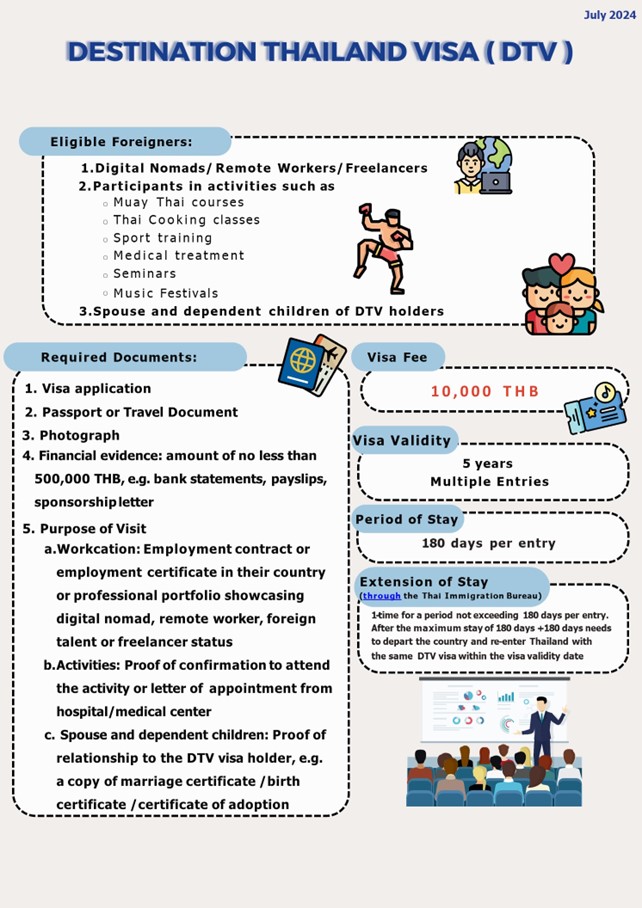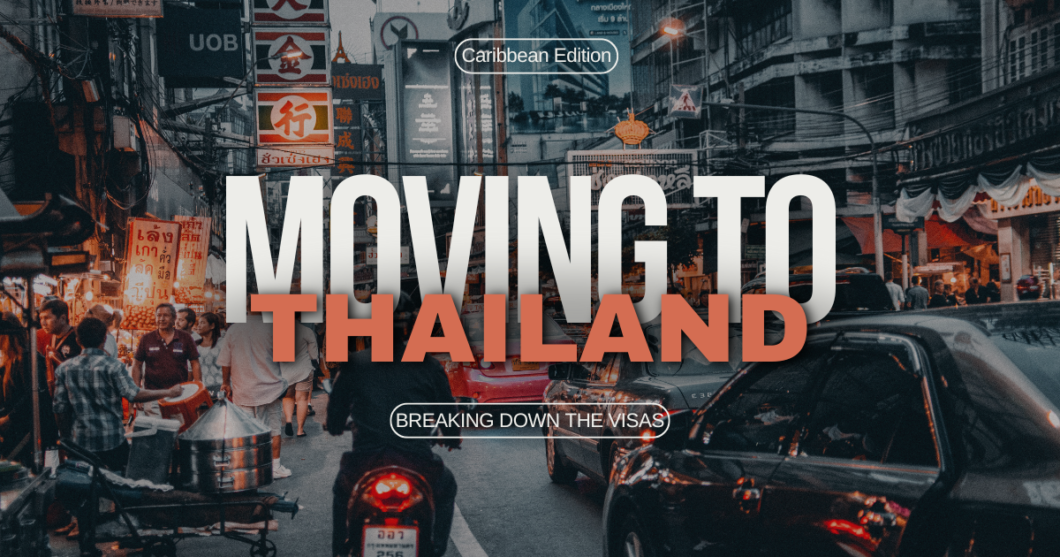How to Migrate to Thailand from the Caribbean
A week ago, I announced my move from Trinidad and Tobago to Thailand. The responses I received were overwhelming—emails, DMs, comments, and conversations all blew up with curiosity. People usually think of migrating from the Caribbean to the usual suspects: the US, UK, or Canada. These countries come with their own set of challenges, including a complex migration process. However, there are other options, and Thailand is an exciting one. Here’s how you can migrate to Thailand from the Caribbean.
Why Thailand?
Thailand offers more straightforward pathways to migration than some of the more traditional destinations. Recently, they have introduced several visa options that make it easier for digital nomads, remote workers, freelancers, or those looking to learn one of the popular Thailand Soft Power Skills to live there. Over the next few weeks, I’ll share my journey and the steps to prepare for this move. Today, we’ll focus on the most crucial aspect: Visas.
Travelling To Thailand Without a Visa
In August, Thailand expanded their list of Visa Exempt countries from 64 to 93. In those additions, Caribbean countries like Trinidad and Tobago, Jamaica and Dominica have been added to that list.
We are now able to go to Thailand without a visa and get a 60-day stamp on arrival.
You are able to get an extension of an additional 30 days before you need to leave Thailand.
Here is the good news, if you want to do a stay in Thailand for a year, you can do so without a Visa but you will need to do some border runs.
How this works, you can stay for 3 months and then do a border run to a neighbouring country, drive across the border and go shopping or go for lunch and then when you come back to Thailand, you will get a fresh 60-day stamp.
You can do this cycle for a year before immigration reserves the right to pull you aside and ask you about your long-term plans for Thailand and at that point, you should start considering some of the options we speak about below.
There are even more visa options from Retirement Visa, Long Term Residency, The Thai Elite Visa and many more, reach out to a visa agency to get the full scope and get the best visa option for you.
Thai E-Visa Website
The most important website you will need to know about is the Thai E-Visa Website. This will give you the information on whether or not you can visit Visa Free and for how many days, it will help you choose the right visa for you and when you are ready to apply for a Visa, this is the website you will be doing it on, unless you are going through an agency.
Visa Options
Thailand has made significant changes to its visa system over the past month, particularly for digital nomads, remote workers, freelancers, and those interested in learning Thai skills such as Muay Thai, cooking, and Thai massage. This new visa provides multiple avenues for migration.
Visa-Free Entry
Thailand has expanded its list of visa-free countries from 63 to 94, including Trinidad and Tobago, Jamaica, and Dominica. Residents of these countries can now enter Thailand without a visa for up to 60 days. Here’s how you can explore this option:
- Visit the Thai Visa Website: Go to ThaiVisa.go.th and click on “Do I need a tourist visa?” Enter your passport country and location to check if you need a visa.
- Test the Waters: If you’re from Trinidad and Tobago, Jamaica, or Dominica, you can visit Thailand without a visa for 60 days, extendable for an additional 30 days. Simply book your flight and go.
- Border Runs: To stay longer, you can do a “border run” by visiting a neighboring country like Cambodia or Laos and re-entering Thailand for a new 60-day stay. This process can be repeated multiple times, but after a year, immigration may inquire about your long-term plans.
Education Visas
If you plan to stay in Thailand for more than a year, consider applying for an education visa. This visa is available to those who wish to learn Thai language, Muay Thai, Thai cooking, or Thai massage. Here’s what you need to know:
- Application Process: Find a government-registered school to file your education visa application. Fees typically include tuition and visa paperwork. For example, I was looking at Master Toddy’s Muay Thai program which costs around 20,000 TT dollars (approximately 3,000 USD) per year.
- Visa Conditions: Education visas are valid for one year and require reporting to immigration every 90 days. Some people have renewed this visa annually for over ten years.
Just Google schools and reach out to them to see if they offer the education visa or you can check out any number of Visa Agents in Thailand and they can help you select the right school that meets your needs and assist you in getting the education Visa.
The visa agency I was going to use and had meetings with was Thai Kru – Thai Kru Website.
They can help you with a wide assortment of things, from Visas, Border Runs, Opening Bank Accounts and getting a Thai Driver’s License.
The advantage to using an agency is that you have fewer headaches and the heavy lifting is done for you.
Additional Education Visa Info – Check out Moving to Thailand’s Education Visa Breakdown.
Check out Siam Legals Education Visa Breakdown —> Siam Legal Education Visa.
Destination Thailand Visa (DTV)
The Destination Thailand Visa (DTV) is ideal for digital nomads, remote workers, and freelancers:
- Application: Apply online through the Thai visa website. The fee is 10,000 Thai Baht (approximately 282 USD or 1,900 TT dollars) for a five-year, multiple-entry visa.
- Stay Conditions: You can stay for 180 days before needing an extension, which costs 1,900 Baht (about 360 TT dollars or 283 USD). After 360 days, a border run is required to get a new 180-day stamp.

If you are truly looking to Migrate To Thailand, this may be the best visa option for you. They do offer other longer term visas but there are more financial requirements. Since I would not be looking into the Thai Elite Visa or the Long-Term Resident Visa, I would not dive into it here.
Financial Requirements
For the DTV, you must show proof of financial stability, with at least 500,000 Thai Baht (93,000 TT dollars or 14,000 USD) in your bank account. This is not required for the education visa.
Dependents
If you are currently holding a DTV, you are also able to bring your spouse and children along to the Land of Smiles. To join you, they will need to submit a separate application to apply for a Destination Thailand Visa. To qualify, the dependant must be:
- A legally-married spouse, or
- An unmarried child below the age of 20
Moving Forward
I plan to apply for the DTV in the coming weeks and will document the process. You can only apply for the Visa within 3 months of the date you are looking to fly into Thailand, so keep that in mind when you are making your plans.
Conclusion
Thailand offers a promising alternative for Caribbean residents seeking new opportunities. Whether you’re interested in a short-term stay or a long-term commitment, Thailand’s visa options are accessible and flexible. If you have any questions, feel free to drop them in the comments, and I’ll do my best to help.
I’ll keep sharing updates as I prepare to migrate to Thailand, and I’m excited to embark on this new adventure. Stay tuned for more content as I explore Thailand and the process of settling in.

Hi ,
I’m 56 years old my husband is 54. We would very much like to immigrate to Thailand.
I am a certified Geriatric Caregiver and Nurse’s Aide as well as a Dental Nurse .
Richard is a Heat Treatment Technician and Supervisor at a food kitchen .
Can you guide us a bit in how to navigate this process . Or point us in the direction ie website /websites that can help in this regard.
Regards
Cassie
Check out these migration specialists:
https://www.thaikru.com/